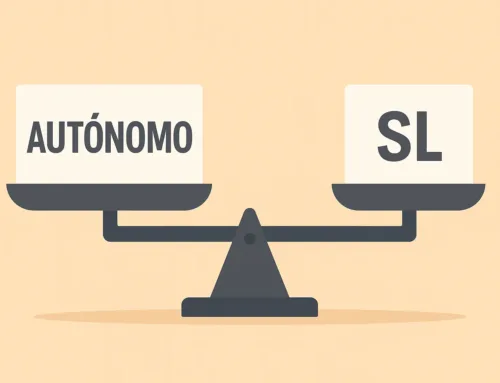
How to become a self employed in Palma de Mallorca as an expat (autónomo)
Many people believe that becoming self-employed in Spain is a complex and overwhelming process, but the reality is quite different. In this guide we explain why, and we walk you step by step through how to register as self-employed in Palma de Mallorca, with a clear focus on expatriates living in Spain who want to work legally and avoid future tax or administrative problems.
For any accountant in Palma de Mallorca, this is one of the most frequent consultations from expats, freelancers and digital nomads. Spanish tax and Social Security rules differ greatly from those in other countries, and mistakes can easily lead to penalties, unexpected tax costs or loss of benefits.
What does “autónomo” mean in Spain?
“Autónomo” is the Spanish legal term used to describe a self-employed or freelance worker. It applies to any individual who provides services or sells goods on their own account, without being employed under a standard work contract.
For example, if you move to Spain and want to work as an English teacher, IT consultant or conference speaker, you usually face two options: finding an employer and obtaining a work contract, or working independently as a freelancer. Becoming an autónomo is often the most flexible alternative, as it allows you to work for multiple clients without the administrative complexity of an employment contract.
In practice, it can be as simple as registering, issuing invoices to your clients and paying your taxes. With the support of an experienced accountant, you can be legally earning income in Spain in less time than you might expect.
When should I register as self-employed?
There are many ways to generate income independently, such as offering professional services, freelancing online or selling goods through platforms like Amazon or eBay. Regardless of the activity, if you are providing services or carrying out an economic activity in Spain, you must register as self-employed.
There are no exceptions. Whether you are an English tutor, work in IT, consult for foreign companies or speak at conferences, registration is mandatory. As soon as you start an activity, you are required to comply with Spanish tax and Social Security obligations.
Can I become self-employed without complications?
The ease of the process depends largely on your nationality.
If you are a citizen of the EU, EEA or Switzerland, the process is generally straightforward. You can enter Spain freely, register your activity and become self-employed without major administrative hurdles.
If you are a non-EU national, the process is more complex. You may need a visa to enter Spain, followed by a residence and work permit. In addition, you will need a NIE number and a Spanish bank account before you can complete the self-employed registration.
Requirement for expats: obtaining a NIE
Before starting any tax or Social Security procedure, expats must obtain a NIE (Número de Identidad de Extranjero). This is the official identification number for foreigners in Spain and is mandatory for almost all legal and administrative procedures.
Without a NIE, it is not possible to register with the Tax Office, register with Social Security or issue invoices. For this reason,
getting a NIE in Palma de Mallorca is always the first step for expats who plan to work legally in Spain.
The NIE application requires specific documentation and an appointment with the Immigration Office. Any delay in obtaining the NIE can postpone the entire self-employed registration process.
What are my options? Self-employed vs. company
In Spain, you can either operate as a self-employed individual or set up a company. The most suitable option depends on your income level and long-term business plans.
- The legal process for becoming self-employed is simpler and involves less paperwork.
- Tax compliance is generally easier for freelancers.
- No minimum share capital is required.
For most expats starting their activity, becoming self-employed is the most practical option. However, if your income exceeds approximately €6,000 per month, setting up a company may be more tax-efficient.
What liabilities do I have as a self-employed worker?
Registering as an autónomo involves clear legal obligations. Understanding them from the start is essential to avoid penalties and unnecessary costs.
Social Security contributions
All self-employed workers must register with Social Security and pay a monthly contribution. This provides access to the Spanish public healthcare system and future pension rights.
The standard contribution is approximately €283 per month. Reduced rates apply during the first year, with a significantly lower monthly fee. Additional allowances may apply for women under 32 or individuals over 65.
Taxes as a self-employed worker
Self-employed workers must pay two main taxes: VAT (IVA) and income tax (IRPF).
- VAT is charged on invoices at the standard rate of 21% and filed quarterly. VAT paid on business expenses can be deducted. Refunds are requested at the end of the tax year.
- Income tax is paid quarterly as a percentage of net profit. An annual tax return is filed the following year to calculate the final tax balance.
Quarterly tax returns are due in January, April, July and October.
How to become self-employed in Spain: the five essential steps
1. Obtain a work permit if required
Non-EU nationals must obtain the appropriate visa and work permit before starting the process. Applications are normally submitted at the Spanish consulate in the home country.
2. Get the NIE number
The NIE is required for all further steps and is obtained through the Immigration Office using form EX15.
3. Register your activity with the Tax Office (IAE)
You must declare the start of your activity by submitting form 036 or 037. This registration is informative and does not involve payment as long as turnover remains below €1,000,000.
- NIE number.
- Passport and copy.
- Spanish bank account.
4. Register with Social Security (RETA)
After tax registration, you must register with Social Security under the RETA scheme.
- NIE number.
- Passport and copy.
- Form 036 or 037.
- Tax registration confirmation.
- Proof of address registration.
5. Daily operations and tax returns
Once registered, you can start working and invoicing legally. From that moment on, you must comply with ongoing VAT and income tax obligations.
Managing taxes can be time-consuming, especially for expats unfamiliar with the Spanish system. Working with an experienced accountant in Palma de Mallorca allows you to focus on your professional activity while avoiding costly mistakes and administrative risks.

How to become a self employed in Palma de Mallorca as an expat (autónomo)
Many people believe that becoming self-employed in Spain is a complex and overwhelming process, but the reality is quite different. In this guide we explain why, and we walk you step by step through how to register as self-employed in Palma de Mallorca, with a clear focus on expatriates living in Spain who want to work legally and avoid future tax or administrative problems.
For any accountant in Palma de Mallorca, this is one of the most frequent consultations from expats, freelancers and digital nomads. Spanish tax and Social Security rules differ greatly from those in other countries, and mistakes can easily lead to penalties, unexpected tax costs or loss of benefits.
What does “autónomo” mean in Spain?
“Autónomo” is the Spanish legal term used to describe a self-employed or freelance worker. It applies to any individual who provides services or sells goods on their own account, without being employed under a standard work contract.
For example, if you move to Spain and want to work as an English teacher, IT consultant or conference speaker, you usually face two options: finding an employer and obtaining a work contract, or working independently as a freelancer. Becoming an autónomo is often the most flexible alternative, as it allows you to work for multiple clients without the administrative complexity of an employment contract.
In practice, it can be as simple as registering, issuing invoices to your clients and paying your taxes. With the support of an experienced accountant, you can be legally earning income in Spain in less time than you might expect.
When should I register as self-employed?
There are many ways to generate income independently, such as offering professional services, freelancing online or selling goods through platforms like Amazon or eBay. Regardless of the activity, if you are providing services or carrying out an economic activity in Spain, you must register as self-employed.
There are no exceptions. Whether you are an English tutor, work in IT, consult for foreign companies or speak at conferences, registration is mandatory. As soon as you start an activity, you are required to comply with Spanish tax and Social Security obligations.
Can I become self-employed without complications?
The ease of the process depends largely on your nationality.
If you are a citizen of the EU, EEA or Switzerland, the process is generally straightforward. You can enter Spain freely, register your activity and become self-employed without major administrative hurdles.
If you are a non-EU national, the process is more complex. You may need a visa to enter Spain, followed by a residence and work permit. In addition, you will need a NIE number and a Spanish bank account before you can complete the self-employed registration.
Requirement for expats: obtaining a NIE
Before starting any tax or Social Security procedure, expats must obtain a NIE (Número de Identidad de Extranjero). This is the official identification number for foreigners in Spain and is mandatory for almost all legal and administrative procedures.
Without a NIE, it is not possible to register with the Tax Office, register with Social Security or issue invoices. For this reason,
getting a NIE in Palma de Mallorca is always the first step for expats who plan to work legally in Spain.
The NIE application requires specific documentation and an appointment with the Immigration Office. Any delay in obtaining the NIE can postpone the entire self-employed registration process.
What are my options? Self-employed vs. company
In Spain, you can either operate as a self-employed individual or set up a company. The most suitable option depends on your income level and long-term business plans.
- The legal process for becoming self-employed is simpler and involves less paperwork.
- Tax compliance is generally easier for freelancers.
- No minimum share capital is required.
For most expats starting their activity, becoming self-employed is the most practical option. However, if your income exceeds approximately €6,000 per month, setting up a company may be more tax-efficient.
What liabilities do I have as a self-employed worker?
Registering as an autónomo involves clear legal obligations. Understanding them from the start is essential to avoid penalties and unnecessary costs.
Social Security contributions
All self-employed workers must register with Social Security and pay a monthly contribution. This provides access to the Spanish public healthcare system and future pension rights.
The standard contribution is approximately €283 per month. Reduced rates apply during the first year, with a significantly lower monthly fee. Additional allowances may apply for women under 32 or individuals over 65.
Taxes as a self-employed worker
Self-employed workers must pay two main taxes: VAT (IVA) and income tax (IRPF).
- VAT is charged on invoices at the standard rate of 21% and filed quarterly. VAT paid on business expenses can be deducted. Refunds are requested at the end of the tax year.
- Income tax is paid quarterly as a percentage of net profit. An annual tax return is filed the following year to calculate the final tax balance.
Quarterly tax returns are due in January, April, July and October.
How to become self-employed in Spain: the five essential steps
1. Obtain a work permit if required
Non-EU nationals must obtain the appropriate visa and work permit before starting the process. Applications are normally submitted at the Spanish consulate in the home country.
2. Get the NIE number
The NIE is required for all further steps and is obtained through the Immigration Office using form EX15.
3. Register your activity with the Tax Office (IAE)
You must declare the start of your activity by submitting form 036 or 037. This registration is informative and does not involve payment as long as turnover remains below €1,000,000.
- NIE number.
- Passport and copy.
- Spanish bank account.
4. Register with Social Security (RETA)
After tax registration, you must register with Social Security under the RETA scheme.
- NIE number.
- Passport and copy.
- Form 036 or 037.
- Tax registration confirmation.
- Proof of address registration.
5. Daily operations and tax returns
Once registered, you can start working and invoicing legally. From that moment on, you must comply with ongoing VAT and income tax obligations.
Managing taxes can be time-consuming, especially for expats unfamiliar with the Spanish system. Working with an experienced accountant in Palma de Mallorca allows you to focus on your professional activity while avoiding costly mistakes and administrative risks.
Seguir leyendo
Gestoría en Palma de Mallorca.
Si buscas una gestoría cerca de ti, asesoramos a empresas en el ámbito laboral, fiscal y contable. También somos una gestoría administrativa en Palma y realizamos traspasos de vehículos.














